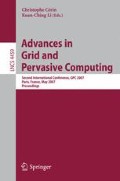Abstract
Limited computing resources may often cause poor performance and quality. To overcome these limitations, we introduce the idea of ad hoc systems, which may break the resource limitation and give mobile devices more potential usage. That is, several resource-limited devices may be combined as an ad hoc system to complete a complex computing task. We illustrate how the adaptive software framework, FRAME, may realize ad hoc systems by automatically distribute software to appropriate devices via the assembly process. We discuss the problem that ad hoc systems may be unstable under mobile computing environments since the participating devices may leave the ad hoc systems at their will. We also propose the reassembly process for this instability problem; i.e., assembly process will be re-invoked upon environmental changes. To further reduce the performance impact of reassembly, two approaches, partial reassembly and caching, are described. Our experimental results show that the caching improves performance by a factor of 7 ~40.
Access this chapter
Tax calculation will be finalised at checkout
Purchases are for personal use only
Preview
Unable to display preview. Download preview PDF.
References
de Lara, E., Wallach, D.S., Zwaenepoel, W.: Puppeteer: Component-based Adaptation for Mobile Computing. In: Proceedings of the 3rd USENIX Symposium on Internet Technologies and Systems, San Francisco, California (Mar. 2001)
Flinn, J., Park, S., Satyanarayanan, M.: Balancing Performance, Energy, and Quality in Pervasive Computing. In: Proceedings of the 22nd International Conference on Distributed Computing Systems, Vienna, Austria (July 2002)
Gu, X., et al.: Adaptive offloading for pervasive computing. IEEE Pervasive Computing 3(3), 66–73 (2004)
Gu, X., et al.: Adaptive Offloading Inference for Delivering Applications in Pervasive Computing Environments. In: Proceedings of IEEE International Conference on Pervasive Computing and Communications, pp. 107–114. IEEE Computer Society Press, Los Alamitos (2003)
Ko, R.-S.: ASAP for Developing Adaptive Software within Dynamic Heterogeneous Environments. PhD thesis, Michigan State University (May 2003)
Ko, R.-S., Mutka, M.W.: Adaptive Soft Real-Time Java within Heterogeneous Environments. In: Proceedings of Tenth International Workshop on Parallel and Distributed Real-Time Systems, Fort Lauderdale, Florida (Apr. 2002)
Ko, R.-S., Mutka, M.W.: FRAME for Achieving Performance Portability within Heterogeneous Environments. In: Proceedings of the 9th IEEE Conference on Engineering Computer Based Systems (ECBS), Lund University, Lund, Sweden (Apr. 2002)
Kumar, V.: Algorithms for Constraints Satisfaction problems: A Survey. The AI Magazine 13(1), 32–44 (1992), citeseer.nj.nec.com/kumar92algorithms.html
Lai, C.-C., Ko, R.-S., Yen, C.-K.: Ad Hoc System: a Software Architecture for Ubiquitous Environment. In: Proceedings of the 12th ASIA-PACIFIC Software Engineering Conference, Taipei, Taiwan (Dec. 2005)
Mckinley, P.K., et al.: Composing Adaptive Software. IEEE Computer 37(7) (2004)
Messer, A., et al.: Towards a Distributed Platform for Resource-Constrained Devices. In: Proceedings of the IEEE 22nd International Conference on Distributed Computing Systems, Vienna, Austria, pp. 43–51. IEEE Computer Society Press, Los Alamitos (2002)
Nomadic Technologies, Inc., Mountain View, CA. Nomad XRDEV Software Manual (Mar. 1999), Information available at http://nomadic.sourceforge.net/production/manuals/xrdev-1.0.pdf.gz
Weiser, M.: The Computer for the 21st Century (Reprinted in IEEE Pervasive Computing, Jan.-Mar. 2002, pp. 19-25). Scientific American 265(3), 66–75 (1991)
Author information
Authors and Affiliations
Editor information
Rights and permissions
Copyright information
© 2007 Springer Berlin Heidelberg
About this paper
Cite this paper
Ko, RS., Mutka, M.W. (2007). An Ad Hoc Approach to Achieve Collaborative Computing with Pervasive Devices. In: Cérin, C., Li, KC. (eds) Advances in Grid and Pervasive Computing. GPC 2007. Lecture Notes in Computer Science, vol 4459. Springer, Berlin, Heidelberg. https://doi.org/10.1007/978-3-540-72360-8_15
Download citation
DOI: https://doi.org/10.1007/978-3-540-72360-8_15
Publisher Name: Springer, Berlin, Heidelberg
Print ISBN: 978-3-540-72359-2
Online ISBN: 978-3-540-72360-8
eBook Packages: Computer ScienceComputer Science (R0)

